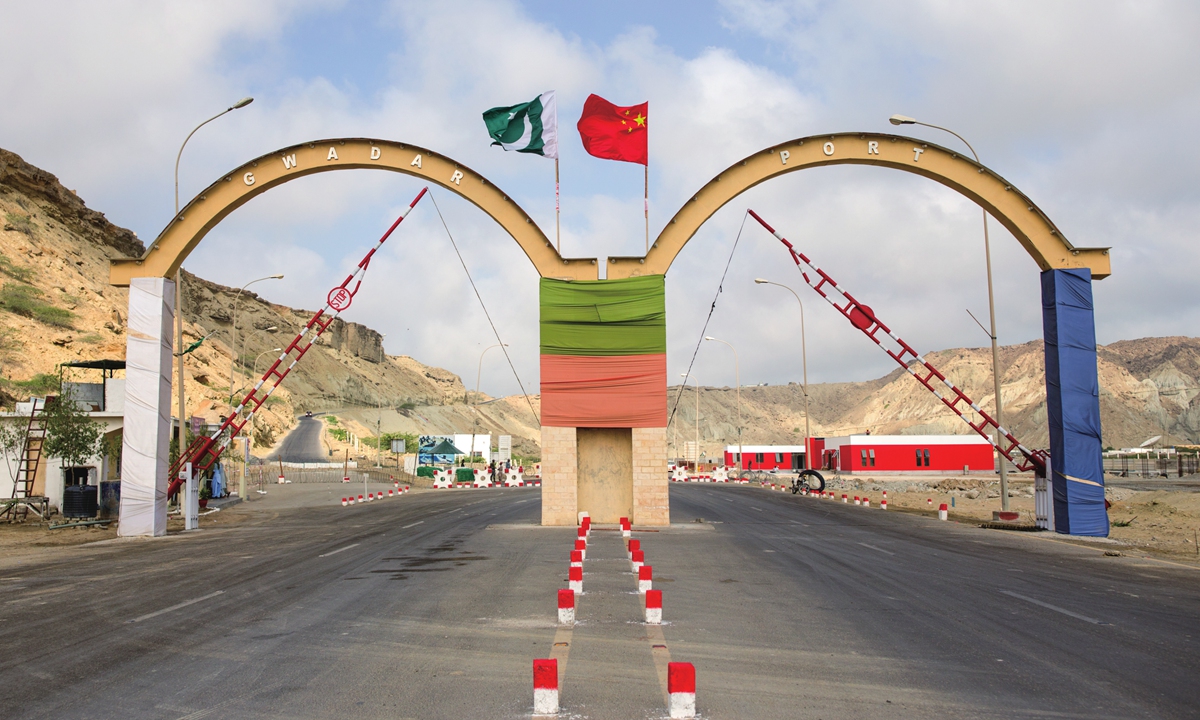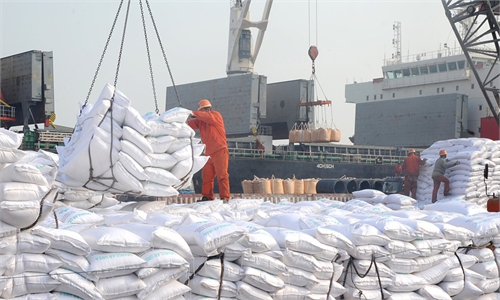Voice of America stories on Gwadar ‘fake news’: Pakistani official, journalist
Negative reports won’t damage ‘ironclad friendship’: Pakistani embassy

The entrance of Chinese-invested Gwadar Port in Pakistan Photo: cnsphoto
Voice of America (VOA) stories trying to link China-Pakistan cooperation to a local protest in Gwadar in Pakistan's southwestern province of Balochistan are "fake news" and will not be allowed to damage the "ironclad friendship" between China and Pakistan, the Pakistani Embassy in China and a Pakistani journalist told the Global Times on Thursday.The VOA ran a lengthy story on Thursday in its Chinese language edition, trying to connect China with a local protest, and suggesting that an earlier comment made by Chinese Foreign Ministry spokesperson Zhao Lijian, who debunked the claims, was false.
Zhao said at a regular press conference on November 30 in response to earlier media reports that reports by certain media on "anti-China protests" in the Gwadar region is completely groundless.
The VOA sought to slam China and the China-Pakistan Economic Corridor (CPEC) project by trying to put in the article concerns on Chinese fishing trawlers and a road that is linked to the Gwadar Port, which is a key project under the CPEC.
Yasir Habib Khan, a journalist for the Gwadar Pro, a local media outlet, who covered the story, told the Global Times on Thursday that the VOA report was groundless and false.
Khan has just returned from his field reporting in Gwadar. His article, which is titled "'China is our friend,' says Gwadar sit-in supreme leader," clearly explained that the protesters "rejected the Western-propelled agenda trying to paint a 23-day-long sit-in as hostile to China."
"China is our friend and we are not at all against China, China-led development, and the CPEC in Gwadar. The people involved in the Gwadar protest and sit-in are not averse to the Gwadar Port being operated by the Chinese company China Overseas Port Holding Company. Rather, they aim to seek the rights to live a life that every Pakistani deserves," the story said, quoting Maulana Hadayat ur Rehman, the supreme leader of the Gwadar sit-in protest.
A press officer with the Embassy of Pakistan in China told the Global Times on Thursday that "the embassy endorses the importance of the ironclad friendship between China and Pakistan, and would not let any negative media reporting or fake news damage this relationship."
The officer said that Zhao has already given a detailed answer and there is no need to "add anything more to it."
Answering a question on a protest in the Gwadar region and Chinese fishing trawlers, Zhao commented on November 30 that it was purely fake news.
It has been verified that there are no Chinese trawlers berthing in the Gwadar Port or fishing in relevant waters, Zhao said.
Zhao emphasized that the Gwadar Port, a flagship project under CPEC, always focuses on development and is livelihood-oriented, and the Chinese side upholds the principle of mutual respect and agreement through consultation in advancing relevant cooperation.
"We firmly oppose certain media outlets' malicious attempts to smear the CPEC and China-Pakistan relations by fabricating disinformation with subterfuge in violation of press ethics," Zhao said then.
Chinese construction giant China Communications Construction Co (CCCC), which is constructing the East Eastbay Expressway, funded by zero-interest Chinese loans with a price tag of $144 million, told the Global Times that it is planning to donate 75 fishing nets soon.
The nets worth 100,000 yuan ($15,701) and a donation ceremony will be held together with local residents at Gwadar, the company said.
Wang Wenbin, another Chinese Foreign Ministry spokesperson, said on Wednesday that bilateral trade between China and Pakistan, and exports from Pakistan to China, are both running at record levels for the year to date.
Wang said that China-Pakistan economic and trade cooperation is mutually beneficial and has delivered tangible benefits to the people of both countries.
Wang added that China is willing to further deepen all-round cooperation with Pakistan to benefit people from both countries.
Despite the fact that many foreign media outlets are also stepping up their slander against Chinese projects in Pakistan, China and Pakistan continue to deepen bilateral cooperation, and the CPEC has achieved a string of successes of late.
The 720-megawatt Karot Hydropower Project, the first hydropower project under the Belt and Road Initiative, successfully closed the gates of the diversion tunnels and started reservoir impoundment in late November.
The two countries signed an agreement on importing Pakistani onions, marking the first deal since the two neighbors embarked on the second development phase of the CPEC, which focuses on cooperation in industrial and agricultural sectors.
Chinese Ambassador to Pakistan Nong Rong said earlier that between January and September in 2021, agricultural trade totaled $860 million, with Pakistan's exports to China reaching $630 million, a two-fold increase year-over-year, while the exports of mangoes alone reached 37.4 tons, a jump of more than 10 times compared with the same period last year.



